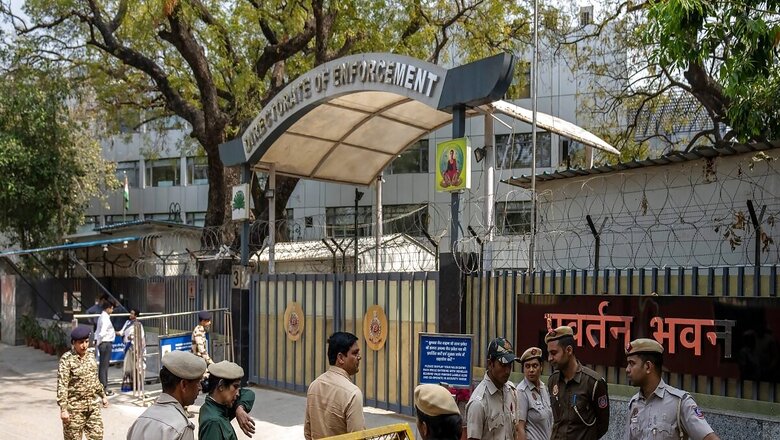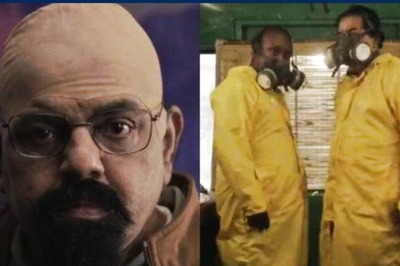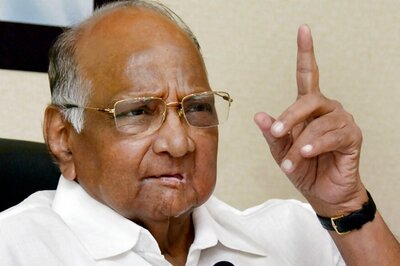
views
The Enforcement Directorate (ED), in the last few years, has been in the eye of a storm, with India’s debilitated Opposition blaming it for all its woes. Is the ED draconian? Has it been targeting the Opposition unfairly? Let the truth be told. The Opposition has failed miserably to match Prime Minister Narendra Modi’s unrelenting popularity which shows no signs of waning. The ED is being used merely as a lame excuse by the Opposition to justify its resounding electoral losses in one election after another.
Let it be known that the ED has been doing a phenomenal job with full integrity. With reference to the ED’s sweeping powers, the Supreme Court on April 5, 2023, refused to entertain a petition filed by fourteen political parties from the Opposition space. These parties alleged that central investigating agencies such as the ED and the Central Bureau of Investigation (CBI) were being weaponised by the Modi government to clamp down on dissent, by arresting Opposition leaders. This verdict, therefore, came as a stinging slap on a combined Opposition that had the gall to doubt the bona fides of our premier probe agencies and then had the audacity to file such a petition in the apex court.
Surely, the Congress and these Opposition parties were caught on the wrong foot when the Supreme Court said that political leaders cannot claim a higher immunity than ordinary citizens and hence a special set of guidelines cannot be issued for them. Imagine the entitlement of the Opposition that it even dared to demand that politicians are a privileged class and need to be treated with kid gloves. The BJP on the other hand, has always stood for inclusivity and has never played the politics of entitlement, bordering on narcissism.
Abhishek Manu Singhvi, the lawyer for the Opposition, eventually had to eat humble pie. He took the court through certain statistics to argue that centrally controlled investigating agencies are being increasingly deployed in a ‘selective and targeted’ manner against political opponents. He argued that while between 2004 and 2014, of the 72 political leaders investigated by the CBI, 43 were from the Opposition, now, this same figure has risen to over 95 per cent. The same pattern, he alleged, is reflected in ED’s investigations as well, with the proportion of Opposition leaders from the total number of politicians investigated rising from 54 per cent (before 2014) to 95 per cent (after 2014).
After outlining the said figures, Singhvi argued that there is a skewed application of CBI and ED jurisdictions and the skewed application of law has a chilling effect on our democracy. Well, Singhvi clearly suffers from selective amnesia, because if democracy has indeed ever been threatened in India, it was only when the Congress regime was in power, including the dark era of emergency under the draconian Indira Gandhi, from 1975 to 1977.
“Are you saying that because of these statistics, there should be immunity from investigation?” Chief Justice Chandrachud asked Singhvi in the April 2023 hearing. Political leaders can’t claim higher immunity, the CJI further added, saying, “The problem with this petition is that you are trying to extrapolate statistics into guidelines, where the statistics only apply to politicians. But, we cannot have guidelines exclusively for politicians.” Singhvi, in a futile bid to score some brownie points for his petitioners, added, “Mass arrests are a threat to democracy. It is a sign of authoritarianism. The process becomes the punishment.” To this absurd and devious charge by Singhvi, the CJI went on to say, “Political leaders stand absolutely on the same standing as the citizens of the country. They do not claim a higher identity. How can there be a different set of procedures for them?”
Chief Justice Chandrachud in April 2023 also, while asking the Opposition/petitioners to come back with specific instances, said that the top court could not lay down abstract guidelines, adding, “It would be dangerous to formulate general guidelines in the absence of such specific facts.” However, clearly, the biggest rebuttal and a clear snub to the 14 Opposition parties came when the CJI told Singhvi, “When you say that space for Opposition has shrunk, the remedy is in that space, the political space. Not the court.” With those words, the CJI called out the bluff of India’s electorally vanquished Opposition which was desperately trying to find a judicial remedy to a political matter, after repeatedly losing elections at the hustings. This petition by Singhvi, on behalf of the Opposition, was put in the trash can by the apex court, sending out a loud and clear message that any attempts to de-legitimise the ED and CBI or the Modi government’s war against corruption, will not find any takers in the highest echelons of the judiciary, unless backed by hard facts.
What the Congress and the TMC say is of little relevance because the mother-son duo of Sonia and Rahul Gandhi are out on bail in the National Herald scam. They have still not been given a clean chit. Again, Abhishek Banerjee, Mamata Banerjee’s nephew, is also out on bail in the ongoing Cash for Jobs scam. The limited point is this—for decades together, the Opposition-led parties, particularly the Congress which ruled India for 54 out of the first 67 years in post-independent India, have been guilty of institutionalising corruption.
PM Modi after taking charge in 2014 started the process of clean, transparent and accountable politics, with zero tolerance for corruption. And it is precisely this no-nonsense attitude of PM Modi that has completely unnerved and rattled the Opposition. Speaking of PM Modi’s unrelenting anti-corruption crusade, besides the April 5, 2023 verdict which came as a shot in the arm for the Modi government, even back in July 2022, the apex court upheld the constitutional validity of the Prevention of Money Laundering Act (PMLA) 2002, thereby dismantling the puerile hopes of a debilitated Opposition which wanted PMLA provisions to be diluted. The verdict relied on a judgement given earlier, under Vijay Madanlal Choudhary versus Union of India. It was pronounced by a bench of Justices AM Khanwilkar, Dinesh Maheshwari and CT Ravikumar on a batch of 241 petitions challenging the validity of the law.
The court upheld the validity of Sections 3 (definition of money laundering), 5 (attachment of property), 8(4) (taking possession of attached property), 17 (search and seizure), 18 (search of persons), 19 (powers of arrest), 24 (reverse burden of proof), 44 (offences triable by special court), 45 (offences being cognizable and non-bailable). The court also held that the supply of Enforcement Case Information Report (ECIR) under PMLA proceedings by the Enforcement Directorate (ED) is not mandatory, since ECIR is an internal document and cannot be equated to a First Information Report (FIR). Supply of ECIR to the accused is not mandatory and only disclosure of reasons for arrest to the accused, during the arrest is enough. Even the ED manual is not to be published since it is an internal document, the court held. It also rejected the argument about the proportionality of punishment under the PMLA Act, with respect to scheduled offences as wholly “unfounded”. The court added that the stringent conditions for bail under the PMLA Act are legal and not arbitrary. Enforcement Directorate, Serious Fraud Investigation Office (SFIO), Directorate of Revenue Intelligence (DRI) officials, and not ‘police’ statements recorded during an inquiry are valid evidence, the Court added, in a stinging rebuttal to Modi baiters and the Opposition which has been making frivolous allegations about the supposed high handedness of the ED.
This landmark judgement by the Supreme Court upholding powers of the ED under PMLA came at a time when the Congress party had been desperately trying to shield the Gandhi dynasty from persistent ED summons to Sonia and Rahul Gandhi who are out on bail in the National Herald money laundering scam. Sonia’s lackey, P Chidambaram, is also out on bail in the INX Media scam. What an irony that while the entire top brass of the Congress is out on bail in either money laundering or tax evasion charges, including the much-maligned Deputy CM of Karnataka, DK Shivakumar, Rahul Gandhi and his minions preach about ethics and integrity to all and sundry.
Besides the Congress, Mamata Banerjee’s TMC has been floundering, with key TMC heavyweights like Partha Chatterjee convicted in the SSC scam, Anubrata Mondal convicted in the Cattle scam and many others from the TMC behind bars. While Mamata can scream from the rooftops about vendetta politics by the BJP, the harsh truth is that the TMC is a web of notoriety and corruption given that the likes of Partha and Anubrata have been close aides of Mamata and were ministers in the West Bengal regime. These TMC heavyweights have been indicted by the courts and not the BJP. While the trial is still underway in most cases, it is clear that TMC leaders find themselves sentenced by the judiciary due to ample evidence and not due to any alleged shenanigans by the BJP.
What the Opposition fails to realise is that the courts have repeatedly upheld the proof submitted by the ED and the CBI and hence each time the Opposition blames the Modi government, it is actually undermining the very core of our impartial judicial process. Backing the ED with a crucial judgement, the top court in 2022 upheld almost all the stringent provisions of the Prevention of Money Laundering Act (PMLA) in proceeds of crime, search and seizure, power of arrest, attachment of properties, and bail, which were under challenge in the court. Section 19, which deals with the power to arrest, does not suffer from the “vice of arbitrariness,” the court said, adding that Section 5 of the Act relating to the attachment of property of those involved in money laundering, is also constitutionally valid. Money laundering not only affects the social and economic fabric of the nation but also tends to promote other heinous offences such as terrorism, offences related to the NDPS etc., the court said.
The petitioners had argued that unchecked power to arrest the accused without informing them of grounds of arrest or evidence is unconstitutional. They further said the ED recording incriminating statements from an accused during questioning under the threat of being fined for withholding information amounts to compulsion. The petitioners said that putting the burden of proof on the accused violates fundamental rights like the right to equality and the right to life.
Another major challenge, that filing PMLA charges on cases that occurred before 2002 (when PMLA came into existence) is unconstitutional, was also turned down last year by the apex court. The Modi government justified it by saying that money laundering is a continuing offence, and not a single act but a chain. Proceeds of crime could have been generated before 2002 but could have still been in possession or in use by the accused, post-2002. ED’s money laundering raids are up 26 times under the Modi government. Proceeds of crime worth Rs 99,356 crore were attached between 2014 to 2022 while only Rs 5346 crore was attached between 2004 to 2014, under an inept Congress regime. While there were 888 prosecution complaints under the Modi government, there were just 104 between 2004 to 2014, showcasing how increased searches endorse PM Narendra Modi’s commitment to preventing money laundering.
The apex court’s verdict upholding arrests by the ED under PMLA is a big blow to the Left and the Congress ecosystem, which has been crying hoarse needlessly about how arrests by ED are such cases tantamount to gross violation of stated procedures.
Coming back to PMLA, what exactly were the concerns of the petitioners, which were in any case found to be devoid of any merit by the apex court in its July 2022 judgement? Well, the petitioners had questioned various aspects of the law including the wide powers given to ED for search, seizure and attachment, the reverse burden cast on the accused to prove innocence, the admissibility of statements made to ED as evidence, the stringent conditions for grant of bail and the impact of predicate offence and its outcome, in PMLA cases.
The Modi government had argued that the offence of money laundering under Section 3 is a standalone offence so long as there is a predicate offence irrespective of whether there is acquittal or conviction in such a predicate offence. Pertinently it was also argued by the Central government that money laundering under Section 3 is a continuing offence, irrespective of the time at which the predicate offence is included in the Schedule. Basically, the apex court stated that money laundering is a standalone offence under the PMLA, in a big victory for the Modi government which has zero tolerance for corruption and has been fast-tracking such money laundering cases, much to the discomfiture of the Opposition. The top court justified the constitutional validity of the provisions of the PMLA, thereby nailing the Opposition’s bluster.
The Modi government has repeatedly defended the amendments to PMLA, saying money laundering poses a threat not only to financial systems but also to the integrity and sovereignty of nations, since it is conducted not just by corrupt businessmen, but also by terror groups. It would suffice to say that honesty is still the best policy under Prime Minister Modi’s government. Also, amidst allegations that its probes are launched for political reasons, the ED has claimed a conviction rate of 96 per cent in cases registered under the PMLA, in which trials have already been completed. According to the latest data released by the ED, of the 25 cases (as of January 2023) with completed trials, 24 resulted in a conviction, leading to the sentencing of 45 accused. Trials are in progress in other 1142 cases, with the ED having filed chargesheets. A 96 per cent conviction rate in PMLA cases is in fact, an excellent rate of conviction, in contrast to the 56 per cent notched in cases prosecuted under the IPC.
During the last 10 years, the ED has also attached assets worth over a solid Rs 1.15 lakh crore in about 2000 attachment orders. It recovered more than Rs 20,000 crore by selling confiscated assets and returning the money owed to the banks by errant borrowers. Major recoveries have been made from the sale of assets belonging to fugitive economic offenders like Vijay Mallya, Nirav Modi and Mehul Choksi. What a travesty of fate that while the Congress shouts and hollers against Nirav Modi in India, in London, it was Abhay Thipsay, a Congress leader, who fought tooth and nail to prove Nirav Modi’s innocence. That Thipsay lost the Nirav Modi case is another matter altogether.
The moot point is simply this–India’s electorally vanquished Opposition has failed to take on PM Modi, given Modi’s unstoppable popularity and his focus on welfarism.
The ED and the CBI are only doing their job impartially, without any political bias whatsoever. Hence it is time for Rahul Gandhi, Mamata Banerjee, Kejriwal and their ilk to wake up and smell the coffee! PM Modi was, is and will always be against corruption. The probe agencies are operating independently, as they should be. The actions of agencies do not depend on whether they will benefit the BJP or not. Last but not least, the BJP has a principled stand against corruption irrespective of electoral advantages or disadvantages.
And most importantly, the common citizens of India are against corruption and stand in complete solidarity with Prime Minister Narendra Modi who has an impeccably clean reputation. The Opposition’s electoral losses are not because there is no level playing field. The Opposition is losing one election after another precisely because it has lost the pulse of India’s voters and still refuses to learn from its mistakes. The AAP had an 18 per cent vote share in Delhi in Lok Sabha 2019 and it did not win a single seat. With a massive 57 per cent vote share in Delhi, the BJP won all 7 Lok Sabha seats, with a 100 per cent strike rate in Delhi, in Lok Sabha 2019. So all this false bravado by Kejriwal and his acolytes about PM Modi and the BJP running scared of AAP is as laughable as it gets.
Even in the Gujarat Assembly elections held in December 2022, the AAP was limited to a mere 5 seats with a 12.92 per cent vote share, vis a vis the BJP at a massive 156 seats with a 52.5 per cent vote share, on the back of an unrelenting Modi wave. Those who accuse the Modi government of discouraging a level playing field should realise that the Indian voter is very aware and smart. By questioning India’s electorate that has repeatedly reposed trust and faith in PM Modi, this cabal of Modi naysayers is only further alienating itself from the voters. In Modi’s New India, a poor woman called Rekha Patra (Sandeshkhali victim) has been given the Lok Sabha ticket from Basirhat by the BJP. In stark contrast, under the Congress, Modi-hating journalists were awarded Padma Shri and more. Today, the very lot that enriched itself for decades under the previous Congress regime in a classic case of “you scratch my back, I will scratch yours” is whining about a level playing field.
Well, the field is a level-playing one because India is a vibrant democracy. What the Opposition lacks, however, is a leader of Narendra Modi’s impeccable reputation and stature. The Opposition certainly cannot blame PM Modi for not having a single leader in its midst who can come even remotely close to Modi’s towering persona.
Sanju Verma is an Economist, National Spokesperson of the BJP and the Bestselling Author of ‘The Modi Gambit’. Views expressed in the above piece are personal and solely that of the author. They do not necessarily reflect News18’s views.




















Comments
0 comment